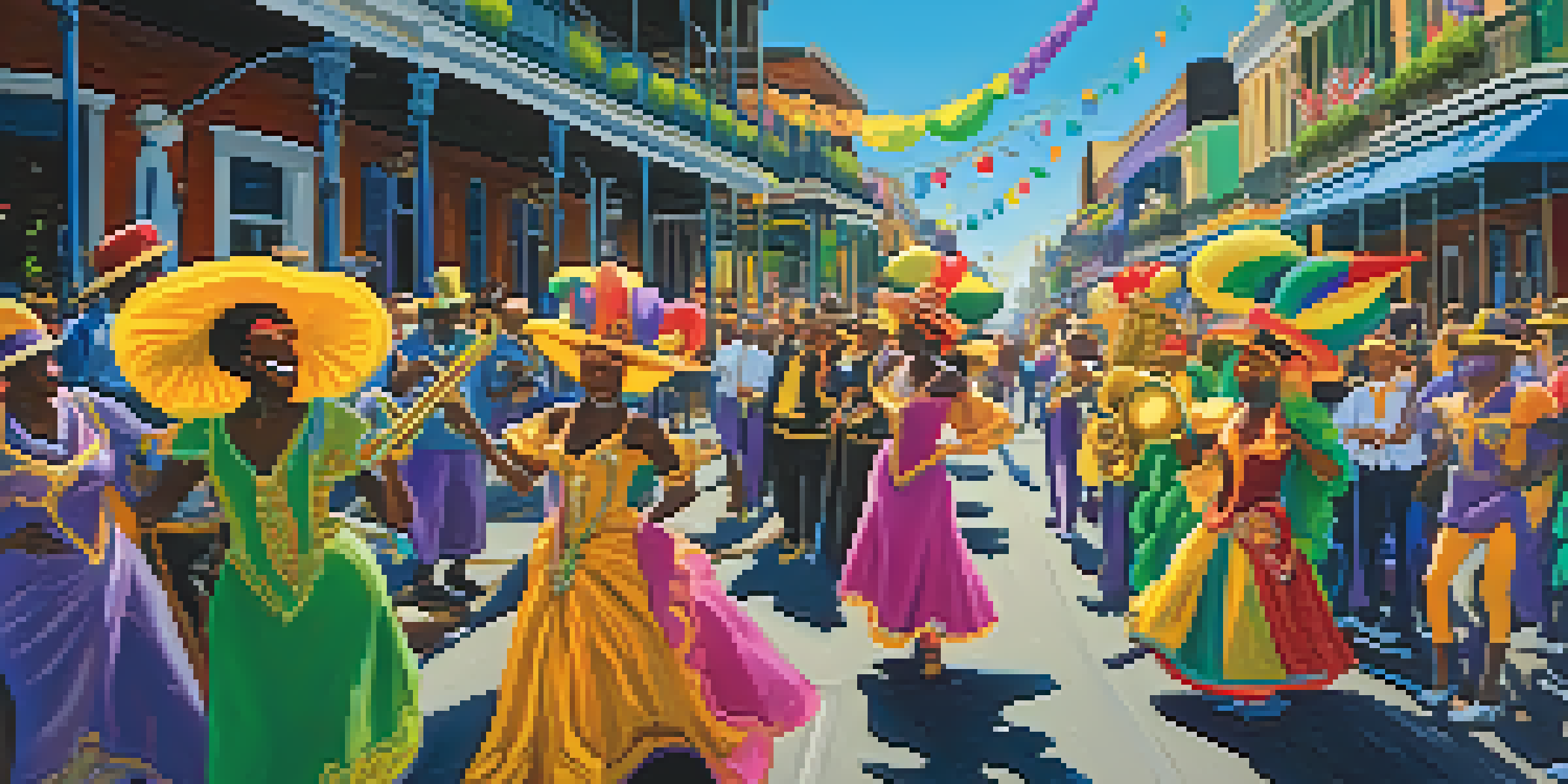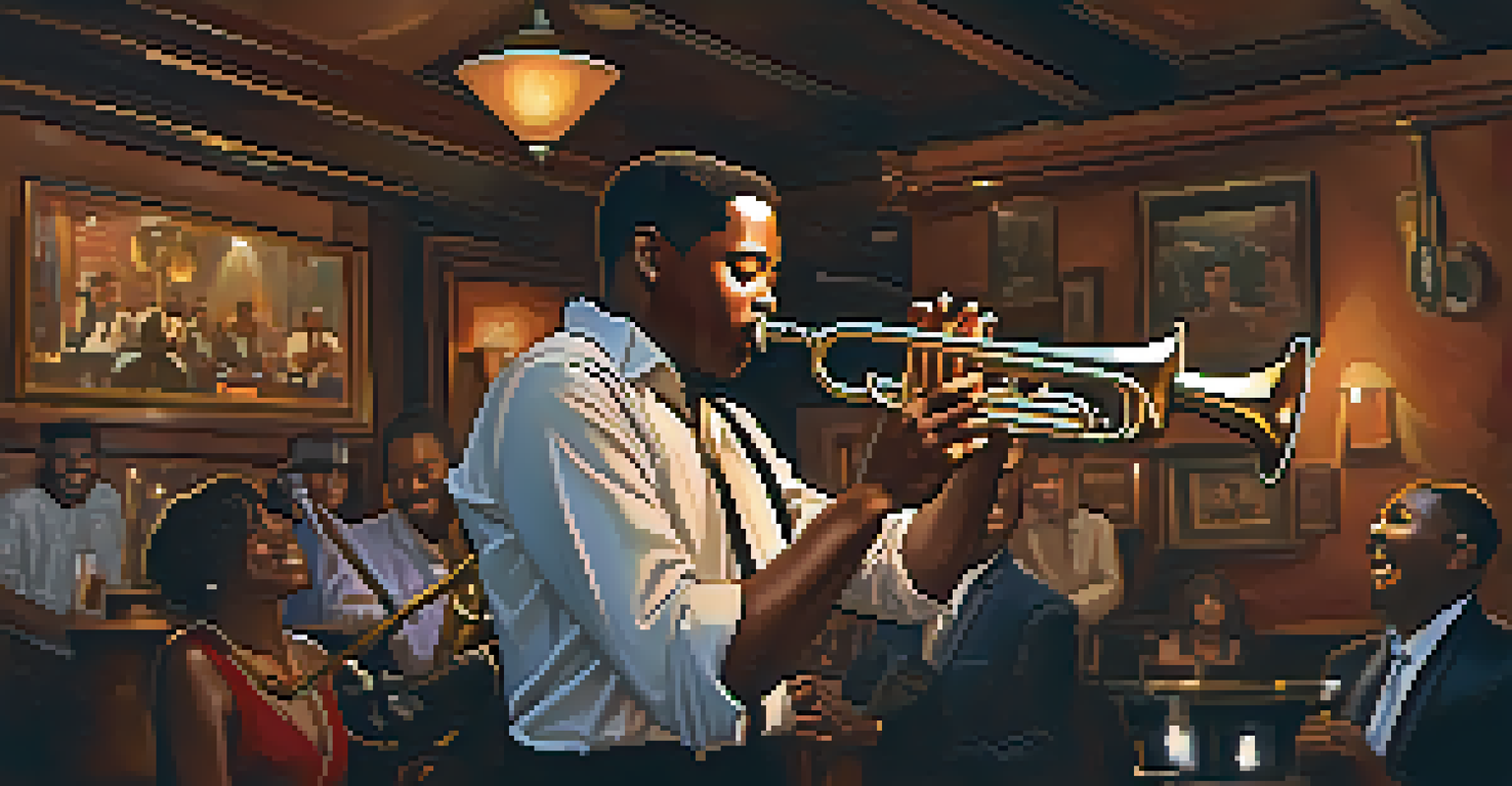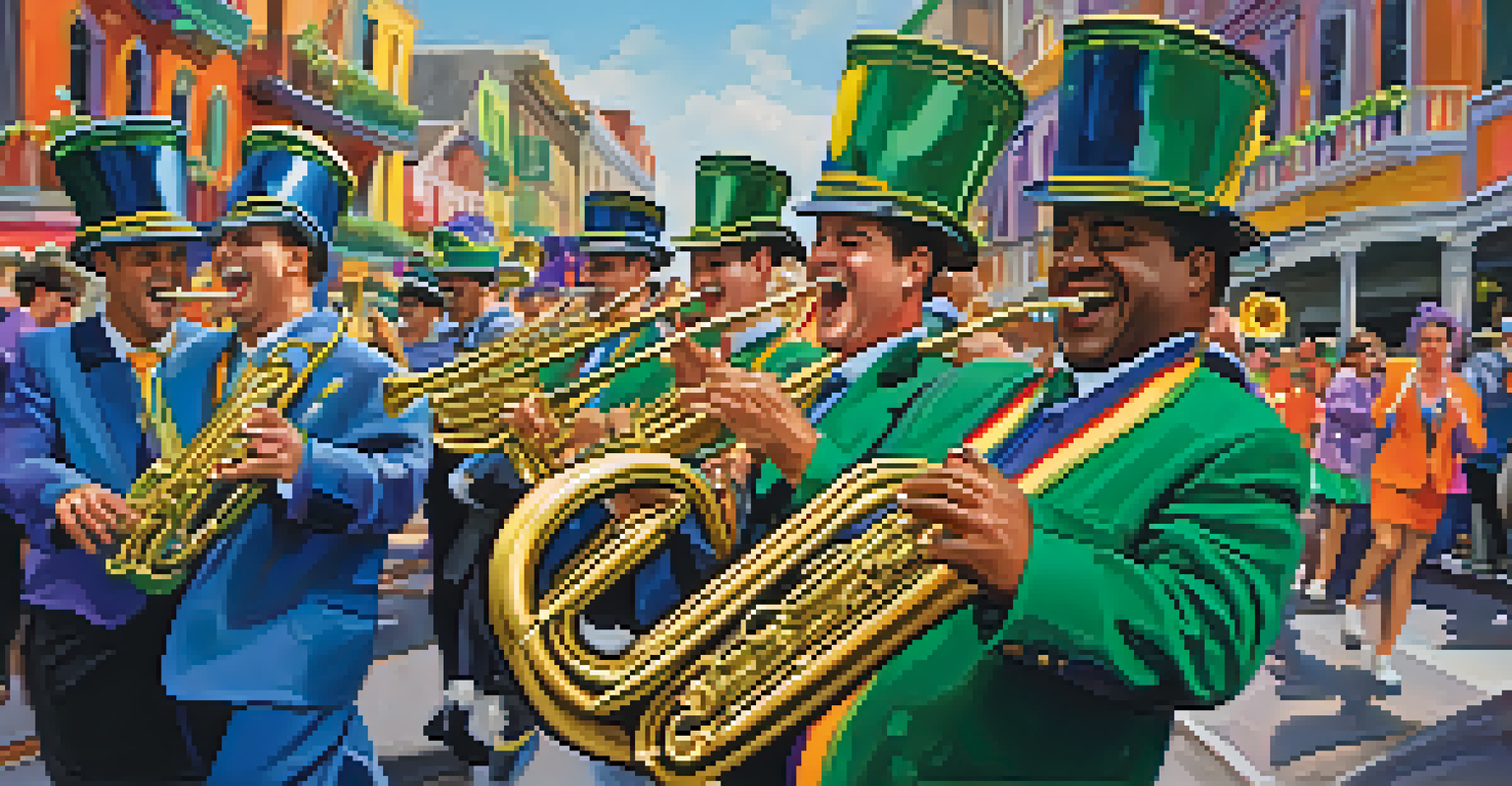Jazz and Mardi Gras: The Musical Connection in New Orleans

The Roots of Jazz in New Orleans
New Orleans is often hailed as the birthplace of jazz, a genre that emerged in the early 20th century. This vibrant city, with its rich cultural tapestry, provided the perfect backdrop for jazz to flourish, blending African, French, Spanish, and Creole influences. Musicians like Louis Armstrong and Jelly Roll Morton became iconic figures, transforming the musical landscape and paving the way for future generations.
Jazz is the music of the people, and it is the sound of the city that created it.
Jazz evolved from earlier musical forms, such as blues and ragtime, incorporating improvisation and syncopation. This creative freedom allowed musicians to express their emotions and experiences, making jazz a deeply personal and communal art form. The lively streets of New Orleans became a canvas for these musical expressions, with sounds spilling from bars, dance halls, and street corners.
Today, jazz remains an integral part of New Orleans' identity, celebrated through festivals and performances year-round. The city's unique blend of cultures continues to inspire musicians, ensuring that the spirit of jazz lives on. As we explore the connection between jazz and Mardi Gras, it's essential to recognize the historical significance that laid the groundwork for this vibrant fusion.
The Birth of Mardi Gras: A Cultural Celebration
Mardi Gras, or 'Fat Tuesday,' is a world-renowned celebration that takes place in New Orleans, marking the culmination of the Carnival season. Rooted in Catholic tradition, it encourages indulgence before the fasting period of Lent begins. However, Mardi Gras has evolved into a lively festival filled with parades, masquerade balls, and music, drawing people from all over the globe.

The history of Mardi Gras in New Orleans dates back to the early 18th century, with French settlers introducing their customs. Over the years, local traditions blended with these influences, creating a unique cultural experience. The flamboyant costumes, vibrant floats, and spirited music reflect the city's diverse heritage and the joy of community celebration.
Jazz: Birthplace in New Orleans
New Orleans is celebrated as the birthplace of jazz, blending diverse cultural influences that shaped its unique sound.
As Mardi Gras grew in popularity, so did its association with jazz music. The energetic rhythms and improvisational style of jazz perfectly complement the festive atmosphere, making it an essential element of the celebration. Musicians take to the streets, filling the air with lively tunes that invite everyone to dance and revel in the spirit of Mardi Gras.
Jazz Music: The Heartbeat of Mardi Gras
During Mardi Gras, jazz music takes center stage, serving as the heartbeat of the festivities. From street performers to organized bands, the sounds of trumpets, saxophones, and trombones create an infectious energy that captivates participants. This musical backdrop enhances the celebratory atmosphere, encouraging people to let loose and enjoy the moment.
Mardi Gras is a time to celebrate life, to celebrate music, and to celebrate culture.
Local jazz musicians often perform at parades and parties, showcasing their talents while honoring the traditions of the genre. The improvisational nature of jazz aligns perfectly with the spontaneous spirit of Mardi Gras, allowing musicians to adapt to the crowd's energy and create unforgettable experiences. It's not uncommon for a passerby to join in, adding their voice or dance moves to the mix.
The integration of jazz into Mardi Gras also highlights the importance of community and togetherness. As people gather to celebrate, the music becomes a unifying force, breaking down barriers and fostering connections. In this way, jazz serves as a reminder of New Orleans’ rich history and the communal joy that Mardi Gras embodies.
The Role of Brass Bands in Celebrations
Brass bands are a hallmark of New Orleans' jazz scene and play a significant role during Mardi Gras. These lively ensembles, often comprised of trumpets, trombones, tubas, and percussion, bring an infectious spirit to the streets. Their upbeat tunes encourage revelers to dance, sing, and celebrate together, enhancing the overall experience of the festival.
Many brass bands trace their roots back to the city's rich history, including influences from African-American traditions and military music. This unique blend contributes to the distinctive sound that defines New Orleans brass bands. The musicians’ passion and energy resonate with audiences, creating an electric atmosphere that embodies the essence of Mardi Gras.
Mardi Gras: A Cultural Fusion
Mardi Gras, rooted in Catholic tradition, has evolved into a vibrant festival where jazz music plays a crucial role in the celebrations.
During the Mardi Gras parades, brass bands lead the way, performing traditional songs and popular jazz standards. As they march, they engage with the crowd, inviting everyone to join in on the festivities. The result is a vibrant celebration that leaves a lasting impression on both locals and visitors, showcasing the musical connection that defines New Orleans.
The Influence of Jazz on Mardi Gras Traditions
Jazz has significantly influenced the traditions and rituals of Mardi Gras, shaping the way the festival is celebrated. The music encourages a sense of spontaneity and creativity, inspiring participants to express themselves through dance, costumes, and festivities. This influence is evident in the colorful parades, where jazz tunes accompany participants as they showcase their elaborate outfits.
The improvisational nature of jazz also extends to the way people celebrate Mardi Gras. Revelers often adapt the music to fit their surroundings, creating a unique experience that reflects the spirit of the moment. This fluidity fosters a sense of community, as everyone comes together to celebrate in their own way, united by the rhythm of jazz.
Moreover, jazz has become synonymous with Mardi Gras, with many songs and anthems paying homage to the festival. From classic tunes to modern interpretations, the music captures the essence of the celebration, making it a vital part of the festivities. As a result, jazz and Mardi Gras have become intertwined, each enhancing the other in a beautiful symphony of culture and tradition.
The Legacy of Jazz and Mardi Gras for Future Generations
The connection between jazz and Mardi Gras is not just a passing trend; it has created a legacy that will be cherished for generations to come. Local musicians continue to draw inspiration from their predecessors, ensuring that the sounds of jazz remain vibrant and relevant. This commitment to preserving the tradition encourages young artists to explore and innovate within this rich musical landscape.
As Mardi Gras celebrations evolve, they remain deeply rooted in the cultural heritage of New Orleans. The incorporation of jazz into these festivities serves as a reminder of the city's unique history and the importance of community. Future generations will undoubtedly carry on this legacy, infusing their own experiences and creativity into the celebration.
Year-Round Jazz Celebrations
The spirit of jazz continues throughout the year in New Orleans, with numerous festivals and events keeping the cultural legacy alive.
By embracing both jazz and Mardi Gras, New Orleans showcases the power of music to connect people and celebrate life. As we look to the future, we can expect this dynamic relationship to continue to flourish, ensuring that the rhythm of jazz and the spirit of Mardi Gras remain intertwined for years to come.
Celebrating Jazz and Mardi Gras: A Year-Round Affair
While Mardi Gras may be a specific event on the calendar, the celebration of jazz in New Orleans is a year-round affair. The city hosts numerous music festivals, jazz clubs, and events that highlight the genre's significance, ensuring that the spirit of Mardi Gras lives on throughout the year. From the New Orleans Jazz & Heritage Festival to intimate performances in local bars, there’s always an opportunity to experience the magic of jazz.
These year-round celebrations not only honor the past but also foster a vibrant music scene that attracts both locals and tourists. The continued focus on jazz musicians and their contributions to the city's culture creates a sense of pride within the community. It also ensures that newcomers can appreciate the rich musical tradition that defines New Orleans.

In essence, the connection between jazz and Mardi Gras extends far beyond the festival itself. It is a celebration of life, culture, and community, inviting everyone to join in the rhythm and revel in the joy that music brings. Whether during Mardi Gras or any other day of the year, the sounds of jazz resonate through the streets of New Orleans, reminding us of the beauty of this enduring connection.